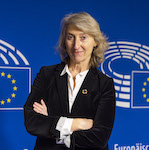
Making maritime transport more sustainable
In the transition towards a more sustainable and independent European maritime transport, which role should we give to gas? Ideally, it shoud not take centre stage.
Gas is a fossil fuel that pollutes, destroys marine and coastal ecosystems, marine biodiversity and has an impact on human health due to its GHG emissions. Moreover, it creates dependence on other countries such as Russia, the United States, Qatar or Saudi Arabia which have large natural reserves and supply numerous European countries. In addition to the pollution directly caused by the transport of energy, energy independence is a key element to ensure food, energy and geopolitical security throughout Europe.
Needless to say, gas is not a sustainable energy source for the maritime sector.
Strongly committed to the ecological transition, the European Union has set itself the objective of achieving carbon neutrality by 2050 with the implementation of the Green Deal. To reach this ambitious goal, a set of legislative texts gathered under the “Fit For 55” package are currently being negotiated to clearly put forward a variety of measures adapted to each sector, including the maritime sector.
The regulation on the use of renewable and low-carbon fuels in maritime transport – also known as Fuel EU Maritime – is currently being negotiated in the European Parliament and has already been adopted within the Environment (ENVI) Committee.
It is clear that an immediate and radical stop to the use of gas is not an option. Ships, as they are currently built, rely on fuels such as oil and gas to operate, given their gross tonnage. If the challenge towards a gas-free transition is heavily linked to the aerodynamics of future ships, a first step lies in the energy mix and the direct use of renewable energies, such as wind propulsion (that should reduce emissions about a third).
I am deeply convinced that strengthening support for research is an essential step towards improving the energy efficiency of ships. This will enable the development of emerging and future innovations, and technologies that respect the principle of neutrality, but also alternative fuels, eco-design, bio-based materials or wind propulsion.
The creation of an Ocean Fund – as part of the text on emissions trading and included in Fuel EU Maritime – will be a valuable tool to support these innovations. It will also help restore biodiversity damaged by cargo ships and the use of fossil fuels.
I am not trying to minimize the magnitude of maritime transport and its role in the global economy, but I simply believe that it is possible to build differently, more sustainably.
The direct use of renewable energies must be further encouraged, including the use of marine propulsion. The current construction of the Canopée ship designed by ‘Zéphyr et Borée’ and built in Poland by the shipyard Neptune from the Netherlands for the European Ariane Group, is an interesting example of what can be done in terms of energy mix in Europe, which could emerge as the champion of the green ships if we strengthen our cooperation.
Indeedn this 121-meter cargo ship will transport Ariane 6 rocket parts to French Guiana. It is a real push towards decarbonisation. Manufacturers are betting on wind propulsion coupled with an LNG engine. Direct use of (?) wind propulsion is made possible by rigid, thick, fully automated wings.
Wind remains an unpredictable energy, but it can reduce the consumption of fossil fuels by 20% to 40%.
I sincerely believe that the increased use of renewable energies is not only the way towards a sustainable and fair transition, but also towards energy independence.
Wind energy remains a very powerful source of energy, which has been used for thousands of years. It is one of the most concrete, efficient, and mature solutions among the alternatives to oil or gas.
Let’s build upon innovative solutions that are respectful of biodiversity, invest much more on renewable energies and cooperate much further at the European level!




